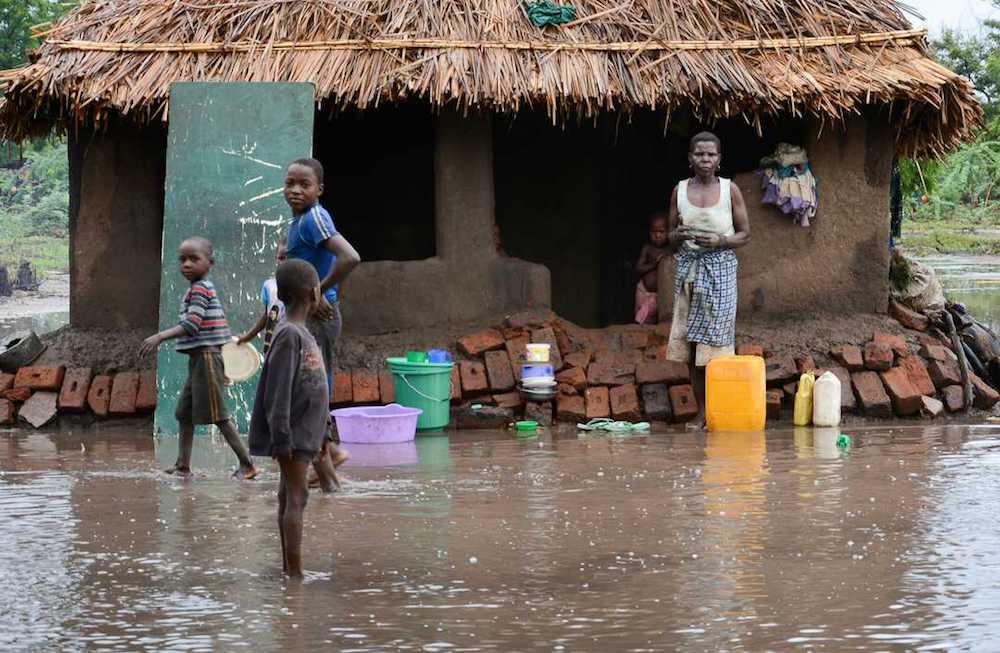The bishops of Malawi are asking for help after devastating floods continue to affect the country.
“We are deeply concerned as an institution which works mainly with the rural communities that the most affected are the poor Malawians, some of whom were already struggling to meet basic needs. While we struggle together to respond to the disaster which has befallen us, we appeal to all Catholics and people of good will, donor agencies and our International development partners to spare the little they might have to support our brothers and sisters who are trapped in this catastrophic condition,” reads the bishops’ March 9 statement.
“This is about human life, human dignity and human rights. It is about the very reason we exist as a church, standing for those in need. Our hearts are heavy to lose human life in such devastating circumstances; we are in a middle of crisis,” continues the statement.
Devastating floods have swept across Southern Africa, killing hundreds of people in Malawi, South Africa and Mozambique and rendering hundreds of thousands homeless.
The relief and development arm of the Catholic Church in the country, CADECOM, has been assessing the damage.
“There is need for urgent humanitarian aid as the affected households are in dire need of life saving interventions such as food, shelter, Water and sanitation. Many are being accommodated in evacuation camps, schools and churches disrupting learning. A total of 187 camps have been established so far and these people are relying on well-wishers to fend for their needs. With congestion in the camps, chances of occurrence of water borne diseases are high, hence need for water and sanitation interventions. Protection issues are also of great need as the marginalized tend to be sidelined,” said Chimwemwe Phiri, the National Coordinator for CADECOM.
“However, the biggest challenges are that we have an uncounted population that is trapped in the waters, which are in dire need of support,” he told Crux.
Caritas is appealing for $280,000 to help the people suffering from the effects of the floods. According to the country’s main utility company, EGENCO, 80 percent of Malawi’s electricity supply has been disrupted.
UN Secretary General Antonio Guterez said he was “deeply saddened” by the loss of life and the “significant damage to people’s homes and livelihoods” as a consequence of the floods.
“The Church has since opened up schools and churches which are now used as temporary shelters. At the national level, CADECOM has held meetings with Caritas Internationalis partners - Trócaire and Catholic Relief Services - in country to collaborate on efforts on mobilizing resources to support the affected communities,” Phiri said.
The Caritas website says the charity will provide households with “cooking utensils, hygiene items, water storage and purification items and help to protect them from future heavy rains.”
In addition, it will work to combat further consequences from the flooding “by ensuring people remain camped on higher ground until the rainy season ends in April. It will also work to limit outbreaks of waterborne diseases by not only providing chlorine tablets but also raising awareness early if there are any signs of such diseases.”
Phiri said Malawi had faced similar disasters in the past, citing the case of 2015 when 15 districts were affected with 106 people killed, 172 missing and 230,000 displaced.
“The 2015 Post Disaster Needs Assessments indicated that damage and loss was valued at $335 million while cost of recovery was projected at $494 million. While the situation has not reached that level, the continued weather indications project more flooding in the coming days which have high likelihoods of creating more economic devastation,” he told Crux.
The Association of Member Episcopal Conferences in Eastern Africa (AMECEA) - the regional Catholic bishops’ organization - has offered its solidarity in the wake of the devastating floods.
“I pray for encouragement to all those involved in rescue operations and humanitarian assistance that they may not tire of supporting their brothers and sisters who need them most during this difficult time,” said Bishop Charles Kasonde of Solwezi, Zambia, and the AMECEA chairman.
“I also pray that our partners and people of good will who have always journeyed with us in both good and bad times may rise up to the call,” he said.

